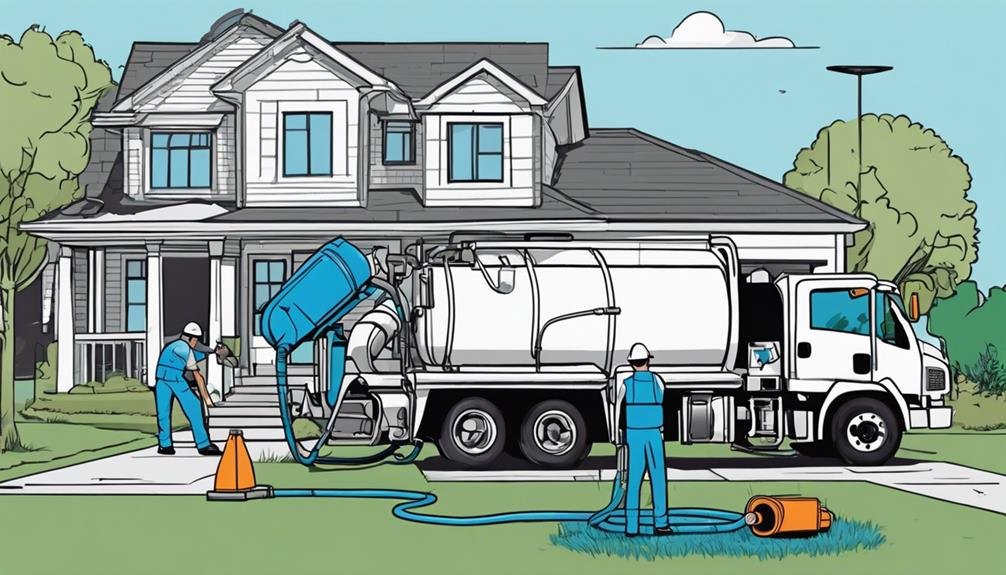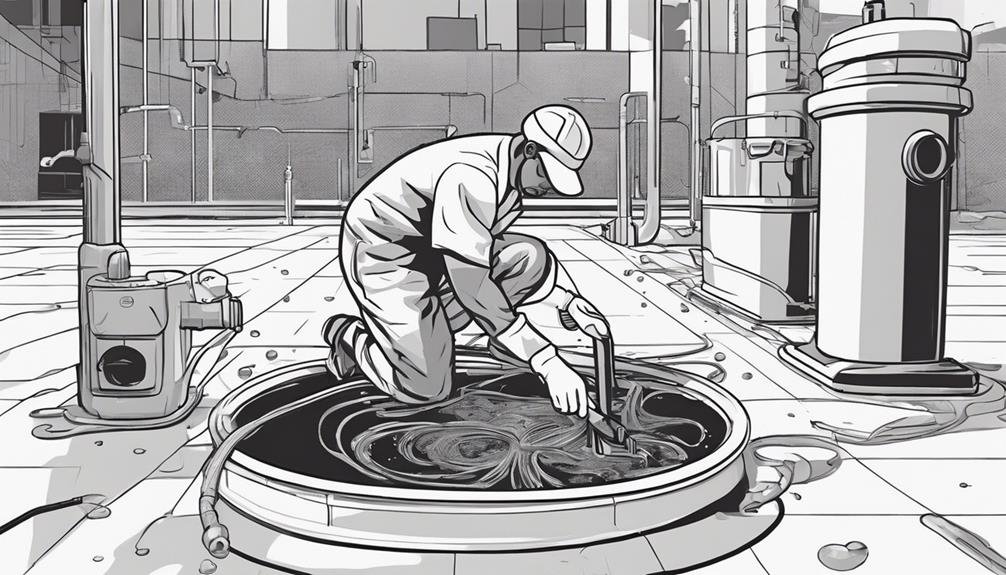Did you know that neglecting septic tank maintenance can lead to costly repairs, with the average repair cost ranging from $3,000 to $7,000? Regular maintenance, including pumping and cleaning, is essential to prevent backups and maintain the efficiency of your system.
By understanding the signs that indicate a potential issue and implementing proper maintenance techniques, you can avoid unpleasant surprises and ensure the longevity of your septic system.
But what are the key essentials you need to know to keep your system running smoothly?
Key Takeaways
- Regular maintenance pumping every 3-5 years prevents backups.
- Professional cleaning services ensure efficient system operation.
- Monitoring for signs of issues prevents costly repairs.
- Proper maintenance techniques extend the life of the system.
Importance of Regular Septic Tank Pumping

Regular septic tank pumping is crucial for maintaining the functionality and longevity of your septic system. The pumping frequency is a key factor that directly impacts the efficiency of your septic system. Experts recommend pumping your septic tank every 3 to 5 years, depending on factors such as household size, water usage, and tank size. By adhering to a regular pumping schedule, you can prevent solids from building up in the tank, reducing the risk of clogs and backups.
The benefits of pumping extend beyond just avoiding backups. Regular maintenance pumping helps in preventing costly repairs and prolongs the life of your septic system. It also ensures that the system operates at its optimal level, reducing the chances of experiencing unpleasant odors or sewage seeping into your yard. Investing in routine septic tank pumping is a proactive approach that safeguards your property and provides peace of mind knowing that your system is well-maintained.
Signs of a Potential Backup
To identify a potential backup in your septic system, watch out for warning signs that indicate a looming issue. Being proactive can help you address problems before they escalate. Here are some key warning signs and prevention tips to keep in mind:
- Slow Draining Fixtures: If you notice slow draining sinks, showers, or toilets, it could be a sign of a clog or backup in your septic system. Address this promptly to prevent further issues.
- Unpleasant Odors: Foul smells emanating from drains or the area around your septic tank can indicate a backup. Regular maintenance and inspection can help prevent this issue.
- Pooling Water: Water pooling in your yard near the septic tank or drain field can signal a backup. Avoid parking vehicles or heavy equipment over these areas to prevent damage.
- Gurgling Sounds: Strange gurgling noises coming from your drains when using water fixtures may indicate a blockage in the system. Consider professional inspection and maintenance to prevent backups.
Proper Maintenance Techniques

Proper maintenance of your septic system requires consistent attention to key tasks that ensure its functionality and longevity. Regular inspections are crucial to spot any potential issues before they escalate. Conduct visual checks on your septic tank and drain field for signs of leaks, standing water, or unusual odors. DIY techniques can help you maintain your system effectively. Keep accurate records of pumping schedules, repairs, and inspections. This information can help you track the health of your septic system over time.
Additionally, be mindful of what goes down your drains. Avoid flushing non-biodegradable items, grease, and chemicals that can harm the system. Use water efficiently to prevent overloading the septic tank. Implement water-saving fixtures and spread out laundry loads to reduce water usage.
Regularly inspecting your septic system and following these DIY techniques can significantly extend its lifespan and prevent costly backups. Remember, proactive maintenance is key to a healthy septic system.
Professional Cleaning Services
Maintaining the cleanliness of your septic system through professional cleaning services is essential to ensure optimal functionality and prevent potential issues. When opting for professional cleaning services, you're investing in the longevity and efficiency of your septic system. Here are some key benefits of utilizing expert techniques for deep cleaning:
- Thorough Inspection: Professionals conduct a comprehensive inspection to identify any existing or potential problems within your septic system.
- Efficient Pumping: Expert cleaners use specialized equipment to efficiently pump out accumulated sludge and waste, preventing clogs and backups.
- Preventative Maintenance: Regular professional cleaning helps prevent costly repairs by addressing issues early on.
- Expertise in Treatment: Professionals apply industry-approved treatments and products that promote the breakdown of solids and maintain the health of your septic system.
Frequently Asked Questions
How Often Should I Check the Level of Bacteria in My Septic Tank?
You should monitor the bacteria levels in your septic tank regularly. It is recommended to check the levels at least once every six months. Maintaining a consistent maintenance schedule will help ensure the proper functioning of your system.
Can Using Certain Household Cleaners Affect the Health of My Septic Tank?
Using certain household cleaners can significantly impact your septic tank's health. Harsh chemicals can disrupt the balance of bacteria, leading to system inefficiency. Septic tank additives can help restore balance, but choose carefully.
What Are Some Common Mistakes Homeowners Make That Can Lead to Septic Tank Backups?
When neglecting septic tank care, you risk costly backups. Maintenance, inspections, and proper waste disposal are crucial. Keep your drain field healthy. Avoid these errors to ensure a smoothly functioning system and prevent headaches.
Are There Any DIY Methods for Preventing Backups That I Can Try Before Calling a Professional?
Before seeking professional help, consider DIY solutions to prevent backups. Regular maintenance, proper waste disposal, and avoiding harsh chemicals can help. Pumping when needed and cleaning key components are essential preventive measures for a healthy septic system.
What Is the Average Lifespan of a Septic Tank, and Are There Any Warning Signs That It May Need to Be Replaced Soon?
The average lifespan of a septic tank varies but is typically around 20-40 years. Warning signs such as slow drainage, foul odors, or pooling water in your yard may indicate the need for replacement soon.
Conclusion
In conclusion, maintaining your septic tank through regular pumping and cleaning is crucial in preventing backups and costly repairs. By staying proactive and recognizing the signs of a potential issue, you can avoid any unpleasant surprises down the line.
Remember, a well-maintained septic system is like a well-oiled machine – it runs smoothly and efficiently, keeping your home and environment clean and safe. Don't wait until it's too late; take care of your septic system today.

